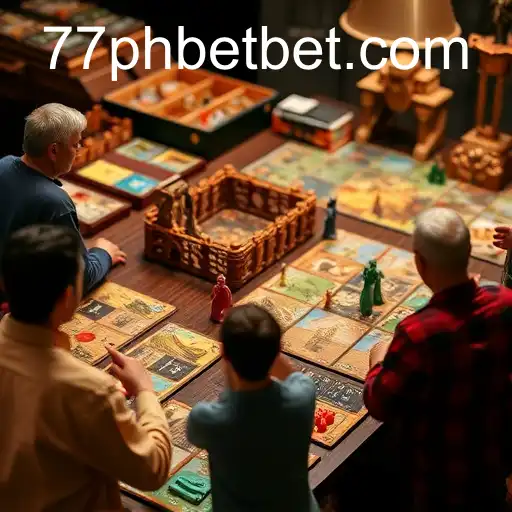
Exploring the Exciting World of 3FruitsWin and the Popular 77ph Bet
Dive into the vibrant gameplay of 3FruitsWin, a thrilling online slot game, and explore the rising trend of the 77ph bet within the gaming community.
Home » Tabletop Game
In recent years, tabletop games have experienced a resurgence, captivating audiences of all ages. From classic board games like Monopoly and Scrabble to intricate strategy games like Settlers of Catan and Gloomhaven, the variety of options available caters to a wide array of interests. The tactile nature of physical game pieces and the face-to-face interaction they encourage make tabletop games a beloved pastime across the globe.
Tabletop games have a rich history that dates back to ancient times. Early forms of these games have been discovered in archaeological sites across Mesopotamia, Egypt, and beyond, with games like Senet and Mancala providing insight into early social entertainment. Over the centuries, tabletop games have evolved from simple race games to complex simulations reflecting various aspects of life and strategy.
In the last few decades, tabletop games have seen a significant rise in popularity. Factors contributing to this increase include nostalgia, the growing popularity of board game cafes, and community events such as game nights. Additionally, platforms like Kickstarter have played a role in democratizing game publishing, allowing independent creators to bring innovative game concepts directly to market and enabling enthusiasts to discover and support niche interests.
The allure of tabletop games lies in their ability to bring people together. In an era dominated by digital interaction and screen time, tabletop games provide a respite where players can engage in genuine, face-to-face socialization. Through gaming, individuals can disconnect from the virtual world and participate in engaging dialogue, strategic thinking, and friendly competition.
Moreover, many tabletop games cultivate a sense of community and inclusivity. They offer opportunities for individuals to come together based on shared interests and cooperative play. Whether through role-playing or team-based strategy games, these interactions foster a sense of belonging and create lasting memories that transcend the games themselves.
Tabletop games vary widely in their complexity and scope. From fast-paced party games to epic adventures lasting several hours, there is something to suit every player’s taste. Strategy games, in particular, captivate players with their depth and the mental agility required for success. Games like Risk and 77ph bet have players calculating moves, anticipating opponents’ strategies, and planning several steps ahead, providing an intellectually stimulating experience.
Beyond strategy, tabletop games also deliver sheer entertainment. Games like Dungeons & Dragons create immersive storytelling experiences, allowing players to craft narratives and explore imaginative worlds. The combination of engaging mechanics and rich narratives keeps players invested, driving them to return to the gaming table time and again.
One of the intriguing entries into the world of tabletop games is 77ph bet. This game blends classic gaming elements with modern twists, providing a unique experience for players seeking both strategy and chance. 77ph bet incorporates a blend of betting components and tactical decisions, challenging players to think critically and adapt immediately to the unfolding game dynamics.
77ph bet’s appeal lies in its dynamic gameplay and replayability. With each session, players are faced with new challenges and opportunities, making every game feel fresh and engaging. The game’s mechanics encourage both competition and collaboration, allowing players to craft their path to victory while navigating partnerships and rivalries.
Tabletop games offer more than just entertainment; they strengthen social bonds and foster relationship building. Playing games in settings such as family gatherings or friendly meet-ups enhances communication skills, encourages teamwork, and offers a platform for shared experiences. These games serve as icebreakers, helping participants learn more about each other and discover mutual interests.
Moreover, participating in tabletop games can improve various cognitive skills. Games focusing on strategy enhance problem-solving abilities and critical thinking, while word games expand vocabulary and improve language skills. These elements come together to make tabletop games not only fun but also beneficial for mental development.
The future of tabletop gaming appears promising, with ongoing innovations and evolving community dynamics propelling the industry forward. As technology continues to integrate with tabletop games via augmented reality and digital enhancements, new and exciting experiences will emerge. However, the fundamental draw of these games—their ability to bring people together in collaborative and competitive play—will likely remain unchanged.
In conclusion, tabletop games are more than mere pastimes; they are powerful tools for social interaction, strategic exploration, and personal development. With titles like 77ph bet adding variety and depth, the world of tabletop games continues to invite new players into its inclusive, engaging arena.


Explore hundreds of slot games, live casino tables, and unique fishing games. We regularly update our collection with new releases, so there’s always something fresh to try.
Enjoy generous welcome bonuses, free spins, and daily promotions. Whether you’re a new player or a returning member, we offers plenty of ways to boost your winnings.
We’re here to help whenever you need it. Our customer support team is available around the clock to assist with any queries or issues.
Take the fun with you! Our platform is fully optimized for mobile devices, allowing you to play on your smartphone or tablet without compromising quality
Step into the exhilarating world of card games with 77ph bet! From timeless classics like Pok Deng and Tongits to the fast-paced excitement of Color Game and Hoo Hey How, our diverse selection captivates every player.
In collaboration with top providers like TP, JILI, KM, FTG, and RICH88, we deliver a stunning array of games that promise nonstop entertainment. Furthermore, each game offers more than just strategy and skill—expect heart-racing action and mind-bending challenges that will keep you engaged at every turn!
77ph bet is excited to offer an exclusive PHP 66 free bonus to kickstart your card gaming journey! Explore our vast library of card games, featuring both beloved classics and exciting new releases that promise endless entertainment.
Use this special bonus to enhance your gaming experience and discover everything 77ph bet has to offer. Whether you’re a seasoned player or just starting, our platform caters to all skill levels. Moreover, enjoy expert tips, strategic insights, and thrilling opportunities to win big!

Dive into the vibrant gameplay of 3FruitsWin, a thrilling online slot game, and explore the rising trend of the 77ph bet within the gaming community.

Unveil the thrill and excitement of DivineDragon, a captivating digital game that combines mythology and strategic gameplay with current gaming trends.

Discover the captivating world of ZapOtecGold, an exciting online game that combines rich storytelling with engaging gameplay. Learn about its rules, features, and the unique experience it offers.

Discover the captivating casino game 'Samba' along with its exciting introduction and rules, while weaving in current events.

Discover the captivating world of SixGacha, an innovative online game that combines strategy and chance with the exciting element of '77ph bet.' Delve into the rules, mechanics, and current trends shaping this emerging gaming phenomenon.

Explore the thrilling world of TreasureoftheGods, a game bursting with excitement and challenges, along with detailed analysis of its rules and gameplay.

77ph bet – The Ultimate Destination for Gaming Enthusiasts Worldwide
